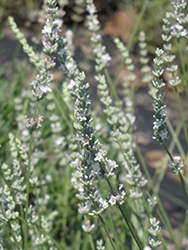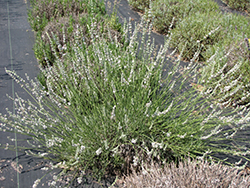It's all about ...
plants

Edelweiss Lavender
Lavandula x intermedia 'Edelweiss'
Height: 30 inches
Spread: 30 inches
Sunlight:
![]()
Hardiness Zone: (annual)
Other Names: French Hybrid Lavender, Lavandin
Description:
This mid-sized selection presents a striking display of intensely fragrant white flowers over a long period; impressive foliage is also beautifully fragrant; excellent for borders, containers, and massing in the garden; used for sachets and perfumes
Ornamental Features
Edelweiss Lavender has masses of beautiful spikes of fragrant white flowers rising above the foliage from mid summer to early fall, which are most effective when planted in groupings. The flowers are excellent for cutting. Its attractive fragrant needle-like leaves are bluish-green in colour with hints of gray. The foliage often turns coppery-bronze in fall.
Landscape Attributes
Edelweiss Lavender is a dense multi-stemmed annual with a mounded form. It brings an extremely fine and delicate texture to the garden composition and should be used to full effect.
This is a relatively low maintenance plant, and can be pruned at anytime. It is a good choice for attracting bees and butterflies to your yard, but is not particularly attractive to deer who tend to leave it alone in favor of tastier treats. It has no significant negative characteristics.
Edelweiss Lavender is recommended for the following landscape applications;
- Mass Planting
- Rock/Alpine Gardens
- Border Edging
- General Garden Use
- Container Planting
Planting & Growing
Edelweiss Lavender will grow to be about 24 inches tall at maturity, with a spread of 30 inches. Its foliage tends to remain dense right to the ground, not requiring facer plants in front. Although it's not a true annual, this slow-growing plant can be expected to behave as an annual in our climate if left outdoors over the winter, usually needing replacement the following year. As such, gardeners should take into consideration that it will perform differently than it would in its native habitat.
This plant should only be grown in full sunlight. It prefers dry to average moisture levels with very well-drained soil, and will often die in standing water. It is considered to be drought-tolerant, and thus makes an ideal choice for a low-water garden or xeriscape application. It is not particular as to soil type, but has a definite preference for alkaline soils, and is able to handle environmental salt. It is highly tolerant of urban pollution and will even thrive in inner city environments. This particular variety is an interspecific hybrid.
Edelweiss Lavender is a fine choice for the garden, but it is also a good selection for planting in outdoor pots and containers. It can be used either as 'filler' or as a 'thriller' in the 'spiller-thriller-filler' container combination, depending on the height and form of the other plants used in the container planting. It is even sizeable enough that it can be grown alone in a suitable container. Note that when growing plants in outdoor containers and baskets, they may require more frequent waterings than they would in the yard or garden.

